|
Play List: 4. Corinne 7. The Mormons 9. Lucy Brandon 10. Storm-Beaten 11. Lady Clare 13. Bachelors 14. Constance 15. Lottie 16. Agnes 17. Alone in London 18. Sophia 19. Fascination 20. The Blue Bells of Scotland 21. Partners 24. Angelina! 25. The Old Home 26. A Man’s Shadow 27. Theodora 29. Clarissa 30. Miss Tomboy 32. Sweet Nancy 33. The English Rose 36. Marmion 37. The Gifted Lady 38. The Trumpet Call 39. Squire Kate 40. The White Rose 42. The Black Domino 44. The Charlatan 45. Dick Sheridan 47. Lady Gladys 48. The Strange Adventures of Miss Brown 49. The Romance of the Shopwalker 52. Two Little Maids from School ___ |
|
ROBERT WILLIAMS BUCHANAN (1841 - 1901) |
|
|
|
|
|
|
|
|
THEATRE REVIEWS 48. The Strange Adventures of Miss Brown (1895) - continued (i)
The Glasgow Herald (8 October, 1895 - p.7) AS the Vaudeville is now required for Mr Weedon Grossmith’s new farcical comedy, Mr Robert Buchanan’s “The Strange Adventures of Miss Brown,” which has been running since last June, was to-night transferred to Terry’s Theatre. I have already given an account of this amusing piece, the success of which at the outset was in great part due to the admirable acting of Mr Kerr and Miss Palfrey, as the young husband and wife. Miss Palfrey, however, is now required for her husband’s enterprise, and she was to-night succeeded by Miss Eva Moore, who, though not in any way imitating her predecessor, gave an excellent representation of the character in which she makes a special mark. There seems no reason why this laughter-provoking, though highly improbable, farcical comedy, should not attain a satisfactory run in its new quarters. ___
The Standard (8 October, 1895 - p.3) TERRY’S THEATRE.—That amusing, if somewhat slight and flimsy, farcical comedy, The Strange Adventures of Miss Brown, by Messrs. Robert Buchanan and Charles Marlowe, which was produced at the Vaudeville on the 26th June last, sufficiently satisfied a section of the public to justify its removal to the little house on the other side of the Strand, where it was played for the first time yesterday evening. Wards in Chancery, surreptitiously married to the men of their choice, have ever figured largely in novels and plays with either serious or humorous purpose, and the only weak spot in the present piece is that the deception practised on the highly-respectable governess of the young ladies’ seminary known as Cicero House, the female pupils themselves, and the police-officer from Scotland-yard, is too transparent, for Mr. F. Kerr, excellent actor that he is, could not possibly pass for a female, and his clever impersonation is not sufficiently a delusion, even for stage purposes. Some changes have been made in the cast, though not to the disadvantage of the interpretation. Miss Eva Moore is charming as the schoolgirl heroine; and Miss M. A. Victor, as the mistress of the establishment; Mr. Herbert Standing, as the detective; Mr. Robb Harwood, as the German music master, Herr von Moser; and Miss Adela Measor, Miss Rosina Filippi, and Mr. Arthur Playfair contribute to the general efficiency of the performance. ___
The Stage (10 October, 1895 - p.12) LONDON THEATRES TERRY’S. On Saturday The Strange Adventures of Miss Brown was transferred from the Vaudeville to this theatre, where it was presented before a well-filled house. Some alteration in the cast has taken place since the initial performance of Messrs. Robert Buchanan and Charles Marlowe’s farce, which now goes as merrily as ever. Miss Eva Moore now plays the runaway schoolgirl, Angela Brightwell, so charmingly as to quite captivate the audience. As Euphemia Schwartz Miss Adela Measor, too, is well suited, and her portrayal is distinctly good. Nothing but praise can be given to Miss Rosina Filippi for her clever and smart performance of Mrs. O’Gallagher. Mr. Arthur Playfair now appears as the Irishman, Major O’Gallagher a part he plays with a fine freedom of style and capital brogue. It marks a great advance in the career of the young actor, who evidently means making a name for himself. The self-important Sergeant Tanner is admirably acted by Mr. Herbert Standing, who is as near perfection as is possible in the character, and a great favourite with his audience. Others in the cast continue to do well as before. Miss M. A. Victor, for instance, is thoroughly good as Miss Romney, Miss Daisy Brough is pretty and simple as the schoolgirl, Matilda Jones; Mr. Robb Harwood gives a clever and strongly characteristic portrait of Herr Von Moser; Mr. Gilbert Farquhar does his best as the Solicitor, and Mr. Frederick Kerr as Captain Courtenay, the young husband, who dons female attire to escape the law, and as Miss Brown causes wild fun throughout the piece, gives, as before, a quietly-effective performance that entitles him to praise. Between the Posts is played as a first piece by Mr. John Buckstone and Miss Adela Measor who both rattle it off in a highly-satisfactory manner. ___
The Illustrated Sporting and Dramatic News (12 October, 1895 - p.17) TERRY’S THEATRE. The Strange Adventures of Miss Brown has outlasted Mr. Frederick Kerr’s right to occupy the boards of the Vaudeville with it, so he has been tempted to find it another home now that Mr. Weedon Grossmith is back again upon his own stage. The notion of course used to be that such a change of quarters must always interrupt fatally even the most prosperous of runs, for tradition and superstition had it that these moves upset plays, players, and playgoers alike. But this theory is long since exploded by practice, and we see on all sides theatrical successes which have sustained the process of transfer without the slightest injury. One of these instances is certainly provided at Terry’s, whither on Monday evening Messrs. Buchanan and Marlowe’s merry farce was removed from over the way without the slightest evidence of injury. We need not again describe the remarkable proceedings which result from an ardent lover’s disguise as a schoolgirl, for the purpose of outwitting the guardians who have imprisoned his sweetheart in a ladies’ seminary. These proceedings if not altogether probable, are at any rate fairly plausible, and when once the first step is granted the rest of the fun, uproarious though it be, seems to follow easily enough. This fun goes just as well at Terry’s as it did at the Vaudeville, whither it has been attracting a continuous stream of laughter-lovers all the summer. In Mr. Frederick Kerr himself as the cavalry-officer, who proves such a bull in a china-shop when he invades Cicero House Academy, there is of course retained the chief member of the original cast; and Mr. Kerr is as happy as ever in keeping the joke void of offence while giving it all necessary comic emphasis. Some of Mr. Kerr’s leading supporters have, however, had to be changed since Mr. Lionel Brough had to leave the rôle of the blundering policeman for Trilby, while Miss May Palfrey has to give up her rendering of the schoolgirl heroine in order to rejoin her husband in Poor Mr. Potton. These two parts are, however, capitally played by Mr. Herbert Standing, and Miss Eva Moore, while the able services of Miss Measor, Miss Filippi, and Mr. Arthur Playfair are now secured to supplement those of Mr. Gilbert Farquhar and Miss M. A. Victor, who, it will be remembered, were in the original cast. With all these clever people to carry on the joke it was not surprising that it went as well as ever, and bid fare to hold its own for many a merry evening yet to come. |
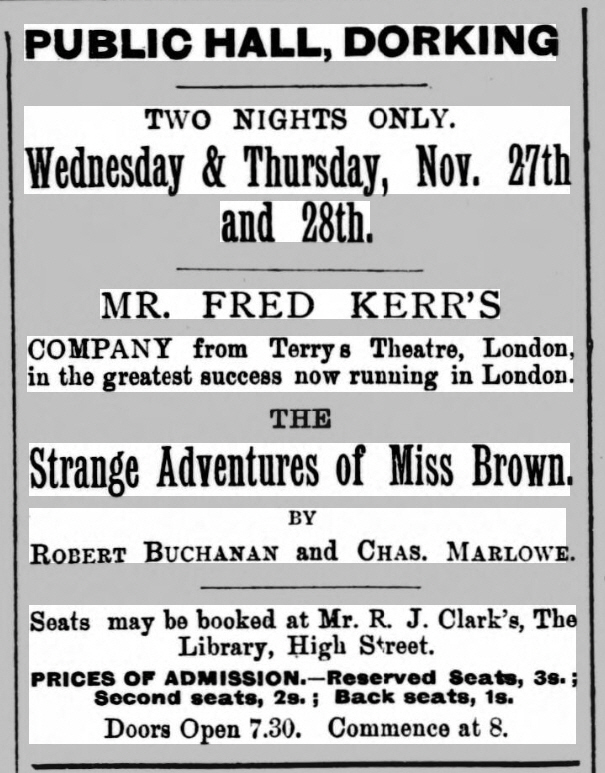 |
|||
|
[Advert for the touring production of The Strange Adventures of Miss Brown |
|||
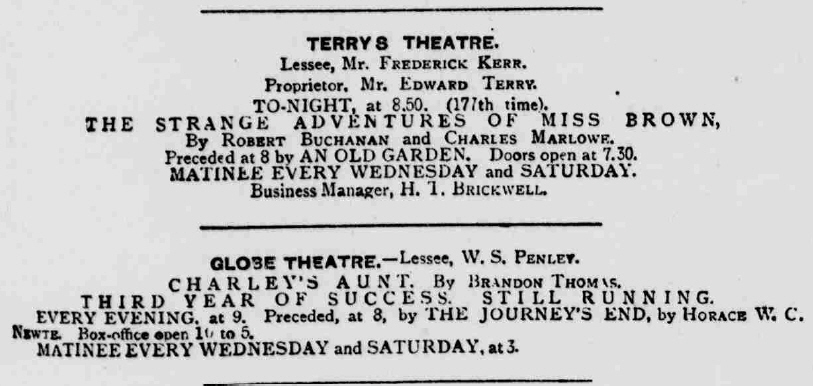 |
|
[Advert from the Pall Mall Gazette (2 December, 1895 - p.1).]
The New York Times (3 December 1895) A FARCE AT THE STANDARD. “The Strange Adventures of Miss Brown” Is a Bit Queer. There was some difficulty in determining whether it was a theatrical performance, in the ordinary sense of that term, or an extremely large family party that took place at the Standard Theatre last evening. Everybody in the audience seemed to know somebody on the stage, and to take a most cordial and personal interest in his or her—especially her—success. Indeed, so complete and obvious was the sympathy between the people behind the footlights and those in front of them that a close observer almost fancied at moments that the two divisions looked alike. Of course, that must have been merely an optical illusion, but it gave one the sense of being present at an amateur instead of a professional effort to prove that “The Strange Adventures of Miss Brown” is an amusing farce, and that its importation from London was a wise proceeding. In the cast, however, were John T. Sullivan, Harry Brown, Ellen Burg, Jennie Satterlee, and two or three other people with familiar names, and therefore the amateur idea must have been as entirely without foundation as was that in regard to the resemblance. |
|
|
|
___
New-York Daily Tribune (3 December, 1895 - p.7) MISS BROWN AT THE STANDARD. A good farce called “The Strange Adventures of Miss Brown” was brought forth at the Standard Theatre last night, and was received with auspicious favor by a large audience. It is the work of Messrs. Buchanan and Marlowe, and it has been brought here from the London stage by Messrs. J. M. Hill and J. R. Rogers. Its theme is kindred with that of Mr. Toole’s play of “The Don,” written for him by Hermann Merrivale. In “The Don” a young woman, who is a ward in chancery, has privately been wedded to an Oxford student, and, visiting her husband at the university, is disguised in male attire to avoid discovery. In “The Strange Adventures of Miss Brown” an army officer has married a ward in chancery, and in order to escape arrest he is disguised in female attire and is turned loose among the girls. To wed a ward in Chancery without the consent of the Chancellor, if she be a minor, is to commit a criminal offence. In “The Don” that subject is complicated with other subjects, and is treated with good taste. In “The Strange Adventures of Miss Brown” the theme has been handled with broad humor. The incidents are numerous, the situations are comic, the movement is nimble, and the effect is merry. Captain Courtenay elopes with Angela Brightwell, taking her from Miss Romney’s boarding school for young ladies, at Calchester, and subsequently the captain, in the character of Miss Brown, finds himself environed with many difficulties. The piece is amusing, and it was sufficiently well acted, with the following cast: Captain Courtenay ..... John T. Sullivan ___
The World (New York) (3 December, 1895 - p.8) |
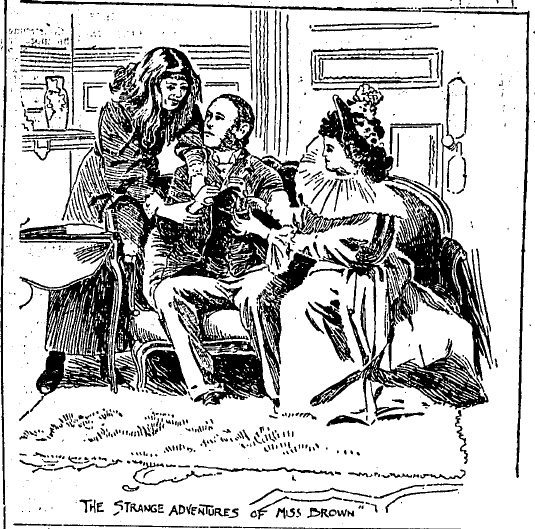 |
|||||||||
|
IT OUGHT TO BE FUNNIER. “The Strange Adventures of Miss “The Strange Adventures of Miss Brown,” a farcical play in three acts, by Robert Buchanan and Charles Marlowe, which has been running now for over five months in London, had its first hearing in this country at the Standard Theatre last night. It is founded on a genuinely humorous idea and should be much funnier than it is. Had its theme been developed by a Frenchman it would have probably been highly indecent, but a great deal more could have been made of it without in the least straining the bounds of good taste. ___
The World (New York) (8 December, 1895 - p.28) |
|||||||||
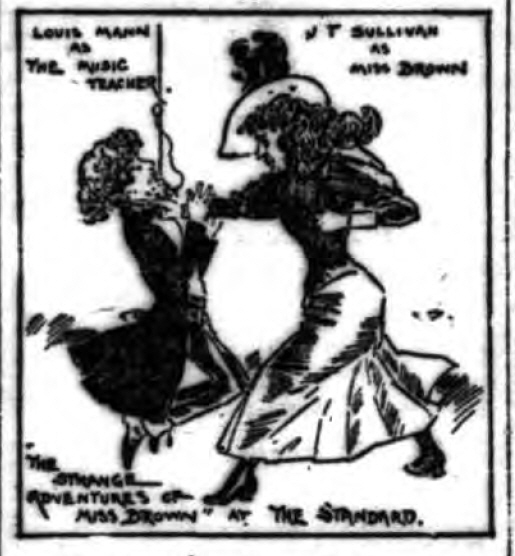 |
|||||||||
|
An Amusing Farce. “The Strange Adventures of Miss “THE Strange Adventures of Miss Brown,” which has been running now for over two hundred nights in London, and which was produced here for the first time at the Standard Theatre last Monday, is the joint production of Robert Buchanan and “Charles Marlow.” Who the gentleman is who chooses to hide his identity under the name of the hero of “She Stoops to Conquer” has not been revealed. Judging from the workmanship displayed in the construction of the piece it is safe to say that he suggested its story and that Mr. Buchanan put it into its present acting shape. ___
New York Herald (8 December, 1895 - p.4) If a Frenchman had written “The Strange Adventures of Miss Brown” it would probably be a funnier play, but also it would probably be quite unfit for a New York stage. We shrink from any suggestion of immorality that is made in the open. ___
Edinburgh Evening News (10 December, 1895 - p.2) “MISS BROWN” AT THE LYCEUM. The piece with which the farcical play which occupies the boards of the Lyceum this week is most easily compared is “Charley’s Aunt.” In both cases the plot revolves around a male who, to meet an emergency, is compelled to masquerade as a female. In “The Strange Adventures of Miss Brown” a cavalry officer, who has married a ward in Chancery, is obliged, in order to escape the clutches of the law, to appear as the niece of one of his brother officers who has been aiding and abetting him in outwitting the Lord Chancellor. The said captain then appears as a boarder at the school in which his wife has been placed by her legal guardian. He plans carrying off his wife, but is frustrated. The inheriting of a title, however, removes all objections to the captain, and the curtain falls on “perfect peace.” The idea of making a cavalry captain appear as a boarder in a ladies’ school is at first sight a risky one. The idea has, however, been carried out by Messrs Robert Buchanan and Charles Marlowe, the joint authors of the piece, in a manner to which no exception can be taken. In comparing the present piece with “Charley’s Aunt,” it must be admitted that the authors are somewhat handicapped by their plot. To make realistic the personation of a school girl is by no means so easy as to personate capably an elderly maiden lady. Nevertheless despite this drawback “Miss Brown” is likely to make lots of friends. The very ridiculousness of many of the situations is enough to cause hearty laughter. The company which plays the piece is a good one all round. Miss Emma Victor as the prim school mistress was capital, while Miss Grace Dudley made a bright and sparkling ward in Chancery. Miss Vida Croly, as the young lady from Demerara, and Miss Kate Hearwood as the sentimental girl of the school, filled their parts capably. Miss Lizzie Scobie played the part of the wife of the Irish major excellently, and one regretted that she only appeared in the first act. On the male side, Mr John A. Warden filled the part of the “heroine” in a mirth-provoking style, the manner in which he from time to time “gave himself away” being most amusing. The part of the Irish major was safe in the hands of Mr Fred W. Sidney, while Mr Stanley Kennis as the German music master, Mr Victor Widdicombe as the solicitor, and Mr J. B. Gordon as the muddle-headed detective, filled their roles capably. “Miss Brown” was preceded by a curtain-raiser of the sentimental type, entitled “An Old Garden.” ___
The Illustrated Sporting and Dramatic News (14 December, 1895 - p.15) MR. F. H. KERR is now among the prophets of the Playgoers’ Club. His new rôle of lecturer seems to have suited him very well; he had some sensible things to say, and said them very brightly. But he must care another time lest he offend the Ibsenites, who are prone to take offence, and are dangerous foes to actor-managers. _____ NO doubt there are many playgoers who will gladly combine philanthropy with pleasure by taking seats for the special benefit matinée, which is to be given at the Haymarket Theatre, on Monday, the 16th inst., by kind permission of Mr. Tree, in aid of Siddons House, of which he is president. It is necessary to raise the sum of two thousand pounds in order to establish the proposed private hospital for the use of actors and actresses, and for carrying it on for two years, after which time it is hoped the institution will be self-supporting. Their Royal Highnesses the prince and Princess of Wales and Princess Mary of Teck have kindly accorded their patronage to the entertainment. The programme will include one act from each of the following pieces: The Strange Adventures of Miss Brown (by permission of Robert Buchanan and Charles Marlowe) by Mr. Fred Kerr’s company; Vanity Fair (with the permission of Mr. Godfrey, the author) by Mrs. John Wood and the original cast; and Trilby (with the permission of Paul Potter and George du Maurier) by Mr. Tree’s Haymarket company. Miss Letty Lind will sing “Ton-Tit,” and give a dance; Miss Fanny Brough and Mr. George Giddens will give a duologue, by Mr. Cotsford Dick; Miss Lena Ashwell will recite; Mr. George Grossmith will give one of his latest entertainments, which has already taken the provinces by storm; Mr. Ben Davies and Mr. Barrington Foote will each give a song; Mr. Rutland Barrington (by permission of Mr. D’Oyly Carte) will give a sketch in which Miss Emmie Owen, Mr. Jones Hewson, and Mr. Rutland Barrington himself will appear, the words being by Frank Desprez and the music by Alfred Cellier. Mr. Arthur Playfair (by permission of Mr. Fred Kerr) will give imitations of popular actors. Tickets may be purchased at the Haymarket Theatre on and after Tuesday, or by letter addressed to Major-General Playfair, Haymarket Theatre, S. W. ___
Punch (21 December, 1895 - p.289) |
|||||||||
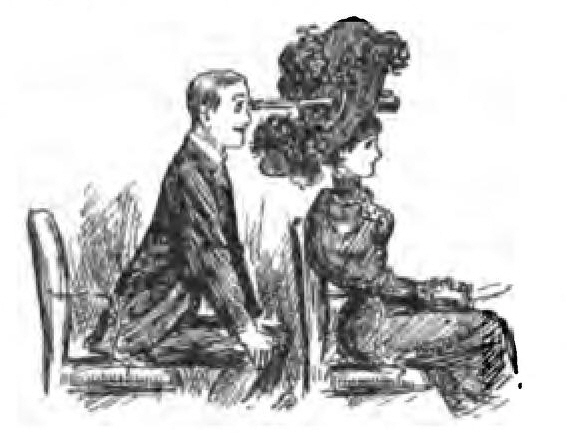 |
|||||||||
|
A (MISS) BROWN STUDY. MISS BROWN, who is a kind of niece to Charley’s Aunt (her parents are Pa BUCHANAN and MAR-LOWE), is going strong at Terry’s Theatre. Apart from the amusing performance of the hero-heroine, Mr. FRED KERR, in the Kerr-acter of Miss Brown (this is a case in which as the part couldn’t be cut down to suit the actor, the actor ought to have been cut down to suit the part), and of Mr. ARTHUR PLAYFAIR as the somewhat burlesquely dashing cavalry officer Major O’Gallagher (without a song! more’s the pity!), the piece would be well worth seeing if only for the capital make-up and the well-sustained DAVID-JAMES’ like performance of Mr. HERBERT STANDING as Sergeant Tanner, the detective; one of the best bits of comedy to be seen just now on the London stage. It is broad without being vulgar; and, except where the exigencies of farce are supposed to demand some extravagance, it is natural. Mr. L. POWER’S Irish Servant is a capital sketch: always funny, never obtrusive. ___
The Era (21 December, 1895) “MISS BROWN” AT TERRY’S. It is a somewhat curious fact that two of the most successful farces now running at the London theatres should have for their principal characters gentlemen in petticoats. Miss Brown, the younger of the two, attained a run of 200 nights on Friday; and from the attitude of a crowded house on that evening, it would seem that her popularity is not likely to fade for a long time to come. Her “strange adventures” form the clou of one of the most hilarious farces that has been seen in the metropolis for years—just the sort of piece, in fact, that appeals to the cheery Londoner, who, when visiting the theatre, desires nothing so much as a couple of hours of hearty laughter. The authors, Messrs Robert Buchanan and Charles Marlowe, have managed their scenes with great cleverness; and the company now playing Miss Brown at Terry’s Theatre, though differing materially from that representing the farce on its original production in June, at the Vaudeville, work together admirably, and secure a representation that is as lively and exhilarating as it can possibly be. |
|||||||||
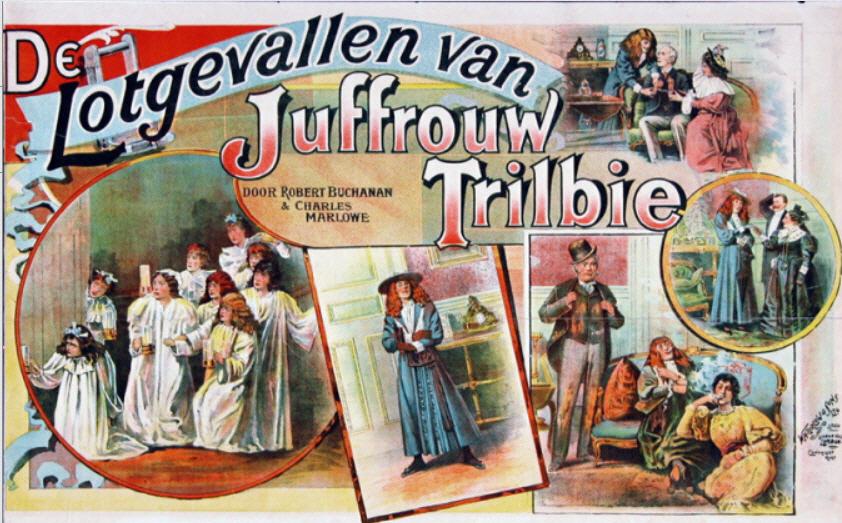 |
|
[Part of the poster for the Dutch production, renamed The Adventures of Miss Trilbie,
The World (New York) (12 January, 1896 - p.37) Frederick Kerr denies the report that he is contemplating a tour of the United States during the coming autumn. Mr. Kerr states that “The Strange Adventures of Miss Brown” will surely run for 500 nights in London, and not until it becomes necessary will the new play, “Jedbury, Jr.,” be produced. The former piece has now been performed 220 times. |
|||||||
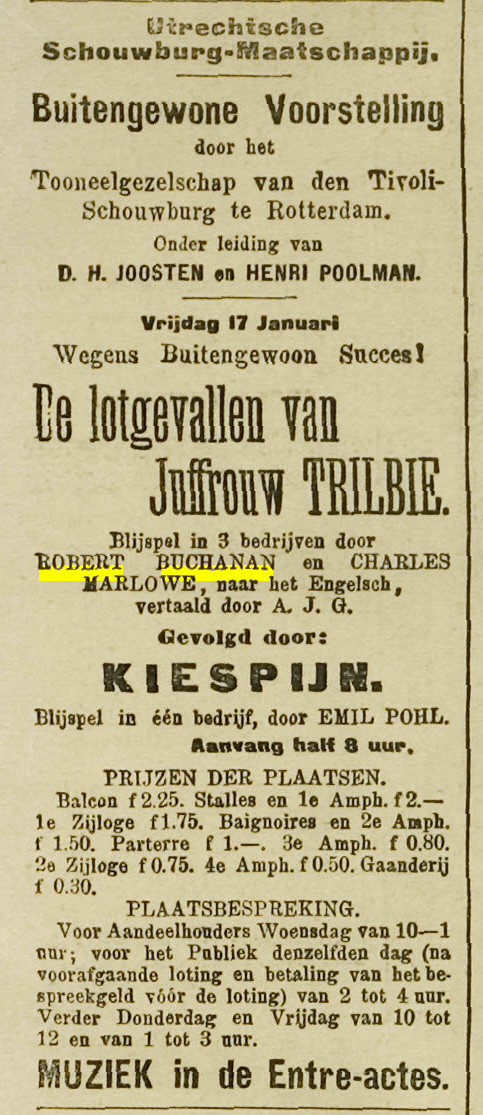 |
|||||||
|
[Advert for De lotgevallen van Juffrouw Trilbie (“followed by Toothache”) from
Pall Mall Gazette (15 January, 1896 - p.1) THEATRICAL NOTES. . . . ___
The Yorkshire Evening Post (1 February, 1896 - p.3) At the Vaudeville rehearsals have this week begun of a new comedy in three acts by Messrs. Robert Buchanan and “Charles Marlowe.” |
|||||||
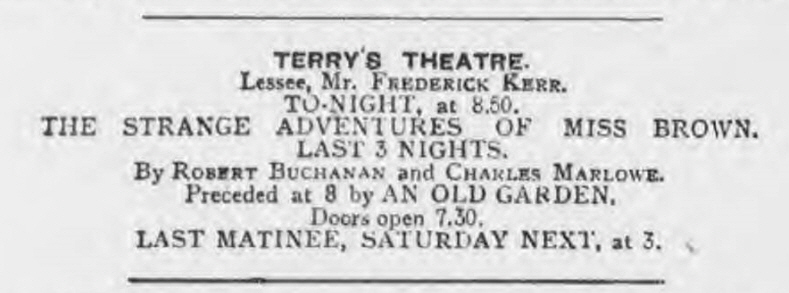 |
|||||||
|
[Advert for the final performances of The Strange Adventures of Miss Brown
Northern Daily Mail (8 February, 1896 - p.6) Owing to the arrangements Mr Frederick Kerr has entered into for the production of “Jedbury Junior” at Terry’s Theatre, the last nights of “The Strange Adventures of Miss Brown,” Robert Buchanan’s merry farce, are now announced. Most of the company now playing at Terry’s Theatre will appear in the new play, in addition to which the services of Miss Maud Millett have been secured. This lady will thus return to the theatre where she, with Mr Kerr, made her great success in Pinero’s charming play “Sweet Lavender.” ___
The Boston Daily Globe (11 February, 1896 - p.4) “Adventures of Miss Brown.” PARK THEATER—“The Strange Adventures of Miss Brown,” a farcical play in three acts, by Robert Buchanan and C. Marlowe. First time in Boston. Major P. O’Gallagher ..... Mr E A Locke In following the strange adventures of “Miss Brown,” who by the way, isn’t a “miss” at all, one is asked to forget only one improbability—that a stalwart and dashing cavalry officer could for a moment pass for even the gawkiest of country maidens in a boarding school. Yet this improbability is no greater than is found in many a more pretentious play, and when once laid aside leaves nothing from which enjoyment may not be gained. ___
The New York Clipper (29 February, 1896) William A. Brady has secured from J. M. Hill the Western rights of “The Strange Adventures of Miss Brown.” He has arranged with Eddie Foy to star as Miss Brown, and the tour will begin in St. Louis, March 16. [Note: More information about Eddie Foy and his involvement with ‘Miss Brown’ is available on a separate page.] ___
The Chicago Tribune (2 March, 1896 - p.3) AMUSEMENTS. Judged from the manner in which it was enjoyed by a large audience no farce comedy ever made a more favorable impression on first presentation in Chicago than “The Strange Adventures of Miss Brown” did at Hooley’s last night. It is so cleverly constructed, nicely staged, and well played that there appeared to be a continuous roar of laughter and applause. ___
The Saint Paul Daily Globe (15 March, 1896 - p.24) PLAYS AND PLAYERS “STRANGE ADVENTURES OF MISS BROWN” AT THE EDDIE FOY IS IN THE CAST. . . . Eddy Foy, surrounded by a company of more than usual merit, will present at the Metropolitan tonight the great New York and London success, “The Strange Adventures of Miss Brown.” The play itself is claimed to be the most pronounced laughing success of the present season. Its original production in New York city was at the Standard theater, the original home of “Charley’s Aunt” and “Too Much Johnson,” and the critics of that city pronounced it infinitely funnier than either of those farces. If the period of its run is any criterion, this should be the case, as it remained there longer than either of the two mentioned plays. |
|||||||
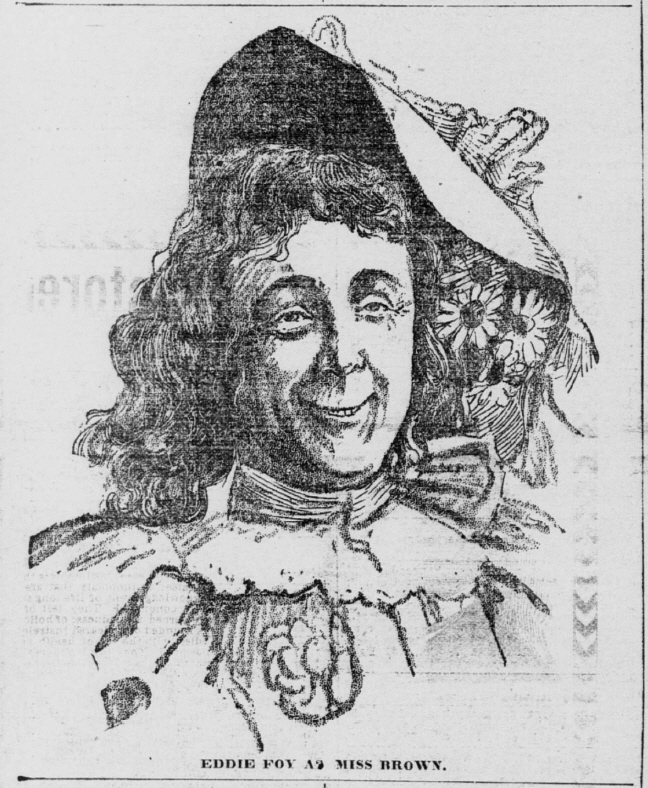 |
|||||||
|
“The Strange Adventures of Miss Brown” are as amusing as they are unusual. A captain in the British army dares to fall in love with a ward in chancery, and marries her contrary to the English law, and in consequence she is sent packing back to boarding school. The captain follows in girl’s clothes, and in consequence eventually finds himself in a dire predicament. The farce is now playing in London, where it has reached its five hundredth performance, and it held the boards the best portion of the season in New York city. Mr. Foy will be seen as Capt. Courtenay, afterwards disguised as “Miss Brown.” The character ought to be right in his line. The situations resulting from the disguise assumed by Capt. Courtenay might easily savor of indelicacy if not carefully managed, but the dramatists, so it is said, have guarded against any such errors of taste and judgment, and produced a farcical creation bubbling over with clean and wholesome fun. ___
The Saint Paul Daily Globe (16 March, 1896 - p.4) AT THE THEATERS. An English farce by Robert Buchanan and C. Marlowe entitled “The Strange Adventures of Miss Brown,” was presented for the first time in this city at the Metropolitan opera house last night. Additional interest attached to the presentation, inasmuch as it served to introduce Eddie Foy as a star in a new line of work. |
|||||||
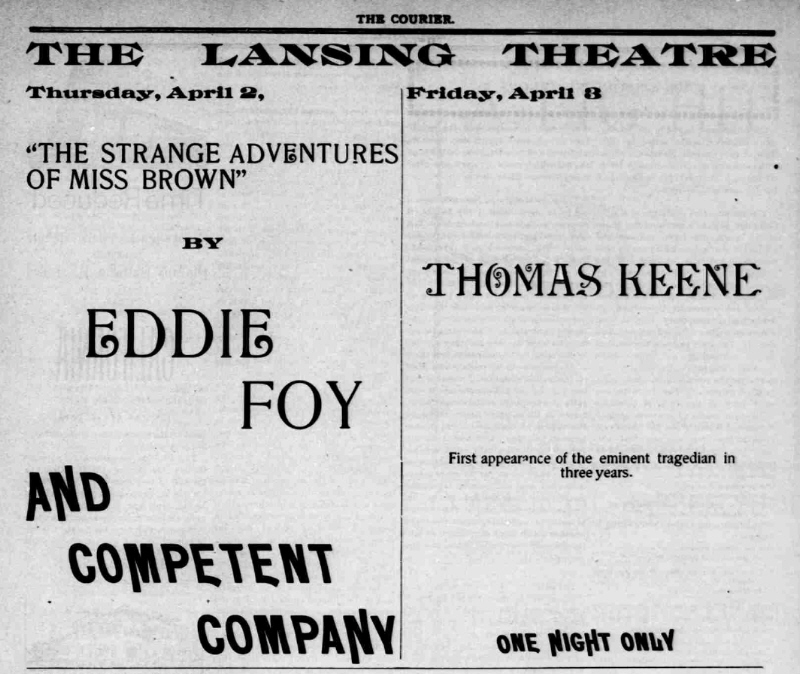 |
|
[Advert from The Courier (Lincoln, Nebraska) (28 March, 1896 - p.5).]
The Courier (Lincoln, Nebraska) (4 April, 1896 - p.5) “The Strange Adventures of Miss Brown” as given by Eddie Foy and company, failed to meet the expectations of those who are familiar with the record of this farce abroad and in this country. Female impersonation is very much overdone. “Charley’s Aunt” and “1492” and a dozen other more or less recent productions have exhausted the possibilities of this role. Eddie Foy has nothing new to present. He has all the coarseness and vulgarity of most of the actors who impersonate women, and he lacks the wit of some of them. There is no attempt to make “Miss Brown” look or act like a woman, and the farce is so broad that there is no humor in it. Whatever may be Foy’s forte it is certainly not a character like that of “Miss Brown.” Miss Lark, who was “Euphemia Schwartz,” was one of a very few members of the company who demonstrated any real capacity. Harry Brown as the Major helped to push the farce along. ___
The Era (4 April, 1896) THE PARKHURST. Miss Romney .................... Miss EMMA VICTOR Those inhabitants of the northern heights who were not fortunate enough to see The Strange Adventures of Miss Brown at the Vaudeville or Terry’s have an excellent opportunity afforded them this week by the Messrs Perfect of laughing at this hilarious farcical play at the Parkhurst, where an excellent touring company, formed by Mr Frederick Kerr, and under the direction of Messrs H. T. Brickwell and John A. Warden, is presenting it. It would be strange, indeed, if such excellent fooling as is provided by Mr Robert Buchanan and Miss Harriett Jay did not tickle the risible faculties of the dweller of Holloway, for during the “adventures” there are plenty of frank excuses for laughter. Mr Charles Cherry as Captain Courtenay, the young officer, who proves the truth of the old adage that love laughs at locksmiths, gives a buoyant interpretation of the part, and when in petticoats, as the wild and incomprehensible Miss Brown, he never fails to be humorous, taking care that his humour never oversteps the bounds of discretion. Among the many good points of a capital impersonation we may mention the first introduction of Miss Brown to Miss Romney, of Cicero House Academy, a part represented in admirable style by Miss Emma Victor. Miss Grace Dudley as that wilful ward in Chancery, Angela Brightwell, is as petulant and piquante as could be wished; Miss Lizzie Scobie as the kindly natured Mrs O’Gallagher does excellent service during her short stay; and other ladies who distinguish themselves in the cast are Miss Vida Croly as Euphemia Schwartz and Miss Kate Harwood as Matilda Jones. Mr Fred W. Sidney makes a jolly and genial character of the mischief-loving Irish Major O’Gallagher; Mr Victor Widdicombe plays in very droll fashion the character of Sergeant Tanner, of Scotland-yard; and Mr Gerald Godfrey quite realises the pomposity of Lawyer Hibbertson. The emotional Her Moser finds a capable representative in Mr Stanley Kenniss, and the smaller parts are efficiently represented by Misses Amy Gerhardt, Bianca Conti, Evelyn Shelley, and Mr A. Thomas. “AN OLD GARDEN” Mildred Sandford .......... Miss VIDA CROLY This agreeable curtain-raiser, it will be remembered, was, after a trial trip at Brighton, introduced into the evening bill at Terry’s in November last. In the representation at the Parkhurst we must recognise the earnestness and sweetness of Miss Vida Croly’s Mildred Sandford and the brightness of Miss Kate Harwood’s Rose Harmer. Mr Victor Widdicombe interests us in the wooing of the hard-headed and honest-hearted young manufacturer, and Mr Stanley Kenniss discreetly gets over the difficulties of the part of the frivolous Philip Melville. |
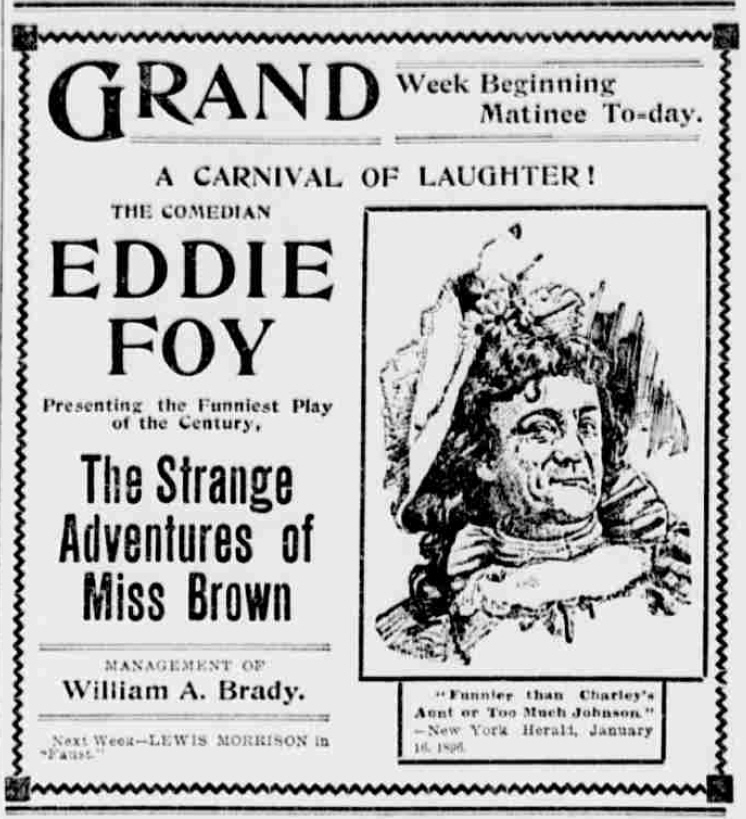 |
|
[Advert from the Kansas City Daily Journal (12 April, 1896 - p.12).]
San Francisco News Letter (2 May, 1896 - p.7) The Strange Adventures of Miss Brown, one of the latest Eastern comedy successes, will be given at the Baldwin next week. It is said to be an amusing transposition of sex, such as Byron wrote of. Eddie Foy plays the Don Juan in the role of the Captain, who afterward becomes Miss Brown. The cheerful Eddie’s name is sufficient in itself to insure merriment. The Foy genius for being funny has gone down into history, and, aided and abetted by what the East has accepted as a first-class company, in a really good play, we may expect laughter without limitations at the Baldwin |
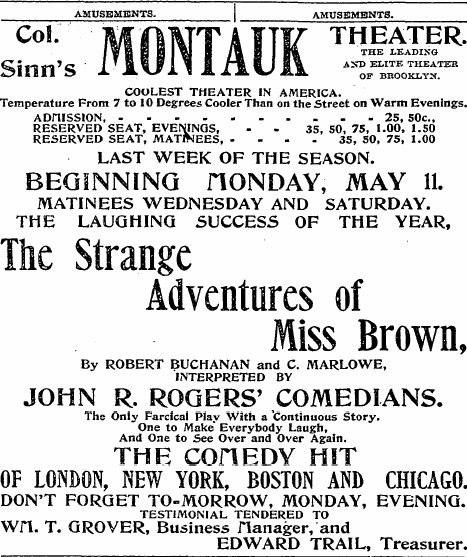 |
|
{Advert from the Brooklyn Daily Eagle (10 May, 1896).]
The Argonaut (11 May, 1896 - p.11) A Man in a Young Ladies’ Seminary. “The Strange Adventures of Miss Brown” was doubtless called into being by the popular success of “Charley’s Aunt.” In that play, a young collegian, having invited some ladies to tea, makes a chum don feminine attire and take the place as chaperon of an absent aunt. The situation gave rise to many amusing scenes, and immediately the hack dramatists turned their attention to making plays in which the hero assumes feminine disguise. In “The Strange Adventures of Miss Brown,” the hero is a young Irishman, an army officer, who marries a ward in chancery without the lord chancellor’s consent, and to escape arrest and carry off his bride, who has been taken from him and returned to school immediately after the marriage ceremony, he disguises himself as a Miss Brown and enters the school as a new pupil. He is abetted in his plan by a brother officer, another Irishman of the kind Charles Lever used to depict in his novels, while against him are arrayed the schoolmistress, a Scotland Yard detective, and a German professor of music, who is also in love with the ward. |
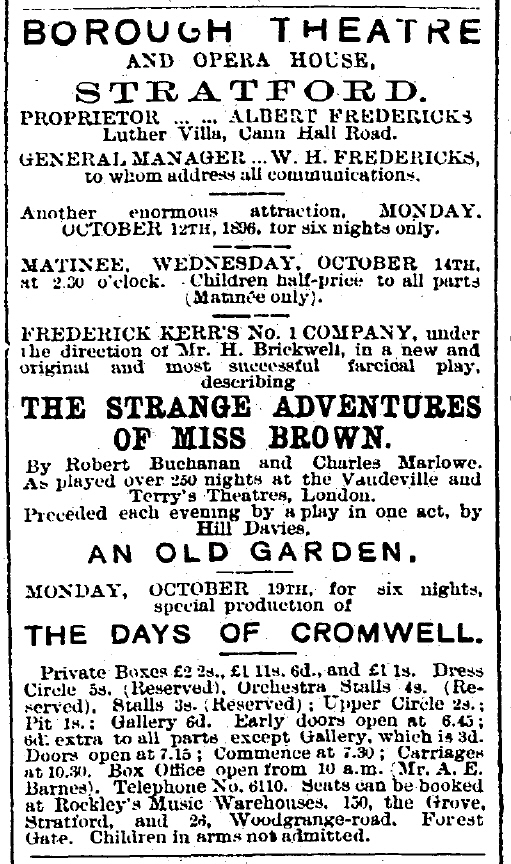 |
|
[Advert from The East Ham Express (10 October,1896).]
The National Observer (13 February, 1897 - p.364) Miss Harriett Jay, formerly well known to the lovers of fiction as the author of The Queen of Connaught and other stories, now publicly advertises herself as the ‘Charles Marlowe’ who has lately been collaborating with Mr. Robert Buchanan in the writing of certain plays. She publishes, through the agency of Mr. Buchanan, the story called The Strange Adventures of Miss Brown, on which he and she based the farcical comedy so named. On the title-page the words ‘Charles Marlowe’ are followed by ‘Harriett Jay’ in brackets, and opposite the title-page is a portrait of Miss Jay. Altogether one does not quite see the object or utility of these transparent noms de guerre. That ‘Charles Marlowe’ was Miss Harriett Jay has all along been an ‘open secret.’ ___
The Globe (22 February, 1897 - p.6) It would appear that the farcical comedy by Mr. Robert Buchanan and “Charles Marlowe,” called “The Strange Adventures of Miss Brown,” and performed successfully both at the Vaudeville and at Terry’s, was founded upon a humorous story by the latter writer, now openly revealed to us as Miss Harriett Jay. Mr. Buchanan himself publishes the story (at Gerrard-street, Shaftesbury-avenue), and a portrait of Miss Jay forms the pictorial frontispiece. Those who saw the comedy represented will be curious to observe how the incidents and dialogue look in narrative form, and those who never witnessed the play will no doubt be attracted to “The Strange Adventures of Miss Brown” in its character of a novel merely. The whole thing is extravagant of course; but it is bright and lively, and calculated to make a long railway journey seem short. It has not much literary merit, but it diverts. ___
The Stage (11 March, 1897 - p.12) THE BRIXTON. The efforts of the management never relax in providing and presenting an attractive bill. This week The Strange Adventures of Miss Brown occupies the boards. Both as to staging and presentation it is fully up to the high level always maintained at this house. Miss Kitty Grattan in playing Angela Brightwell might throw a little more vigour into the part, but otherwise she gives a very able performance. Miss Emma Victor is good as Miss Romney, and the several boarders at the boarding-house are depicted well by Misses Clara Russell, Lilian Maude, Celia Dare, Hilda Cory, and Amy Graston. Mr. Herbert Sparling as Captain Courtney, whose unexpected appearance and unladylike behaviour as Miss Brown being forth rounds of applause from a very appreciative house, is exceedingly clever. Mr. Cory Thomas is smart and crisp as Major O’Gallagher, while Mr. Forsyth Bruce gives a very droll impersonation of the hardly-done-by music- master. Mr. Victor Widdicombe brings many a laugh by his able delineation of Sergeant Tanner. ___
The Era (20 March, 1897) ELEPHANT AND CASTLE. Angela Brightwell .................. Miss KITTIE GRATTAN When The Strange Adventures of Miss Brown was produced at the Vaudeville Theatre on June 26th, 1895, we praised warmly the diverting farcical business, the irresistible frivolity, and the never-flagging fun of the clever and amusing concoction by Robert Buchanan and Charles Marlowe. The creditable and capable rendering of the play which has been given at the Elephant and Castle Theatre this week by Messrs H. J. Wilde and Edward Lytton’s company is in no way calculated to tempt us to a reversal of the favourable verdict which we then pronounced upon the piece; and Mr D’Esterre may be congratulated upon having secured so attractive an entertainment for the present week. A considerable amount of interest which is felt in the “persons of the drama” is devoted to Miss Angela Brightwell, who is represented in Messrs Wilde and Lytton’s company by Miss Kittie Grattan, with chaste simplicity and delicate grace. Miss Clara Russell’s Euphemia Schwartz is a creditable rendering, and possesses much merit. Miss Helen Rous gives a brisk, bright, and humorous performance of the part of Mrs O’Gallagher; and Miss Emma Victor is extremely quaint and comical as the schoolmistress, Miss Romney. Mr Cory Thomas makes a manly and energetic Major O’Gallagher, and sustains the rôle with soldierly spirit. Mr James Lewis contributes a neat interpretation of Private Docherty; and to Mr Forsyth Bruce as Her Von Moser, praise is due for an impersonation which has many excellent qualities. Mr Alfred Tate’s Hibbertson is a polished and natural piece of acting. To Mr Victor Widdicombe must be awarded hearty commendation for his dry, droll, and always effective embodiment of Sergeant Tanner. That excellent and experienced actor, Mr Herbert Sparling, is quite at home in the character of Captain Courtenay, infusing into his reading a congenial flavour of quiet and unobtrusive comedy. The pupils at the school have pleasing and intelligent representatives in Miss Lilian Maude, Miss Celia Dale, Miss Imelda Cory, and Miss Amy Graston. The Strange Adventures of Miss Brown is preceded by the comedietta Man Proposes, a bright little sketch, in which much amusement is created by the manner in which a bashful young man is guided into a proposal by a lively young lady. The said damsel is impersonated with much tact and grace by Miss Imelda Cory, who has an attractive and agreeable appearance and a nice style. Mr Forsyth Bruce gives a funny reading of the part of the shy swain; and Miss Edith Denneth makes a sprightly servant. Both pieces are appropriately dressed and mounted. ___
Wheeling Daily Intelligencer (West Virginia) (9 November, 1897 - p.2) THE CURTAIN DROPPED On Those Theatrical Cases in the The cases arising out of the difficulties between Sidney Cohen, of New York, and the management of the “Strange Adventures of Miss Brown” company, which held forth at the Grand the latter part of last week, figured in the justice shops yesterday. Cohen claimed that the company didn’t cough up the royalties with ghost-walking regularity, and came here Friday night to investigate the whereofness. He also alleged that the manuscript of the play had been stolen from him. _____
The Strange Adventures of Miss Brown - continued
|
|
|
|
|
|
|